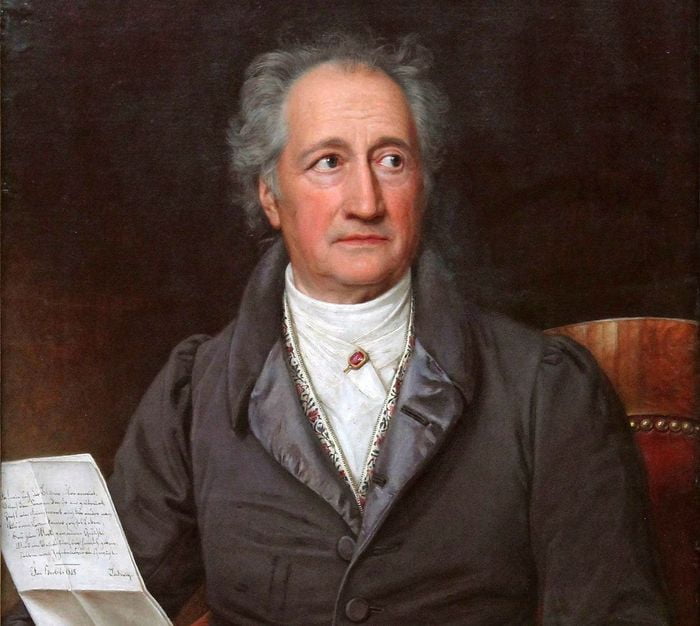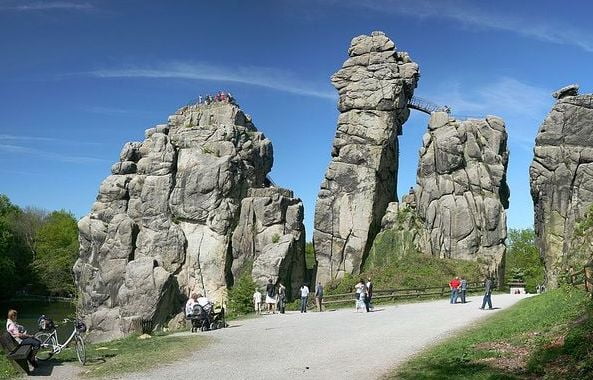Sb, goethe, goethe.
This is me that absolutely must roned at any reference to german culture. So let it be mentioned here!
It is true too, let`s face it: There`s nobody quite like Goethe. The dramas, like `Dr. Faustus` and `Gotz von Berlichingen`(The Knight with the Iron Hand), of Johann Wolfgang von Goethe (1749-1832) are still performed in theaters today. His poems and novels like The Sorrows of Young Werther are still printed and even read.
But it is not the works he produced as poet, writer, theorist and natural scientist that make him such an absolute sine qua non. With his universality and holistic view of nature, Goethe rose above the Catholic-Protestant conflict in which Central Europe had been locked since the 16th century and above the debates between clerics and men of the Enlightenment that were added to it in the 18th century, to become a towering figure who blazed new paths in German culture. Naturally Goethe did not accomplish this singlehandedly.
But it was he alone who was regarded as the precursor of the three, very distinctive, `Sturm und Drang`, classical and romantic movements. Overshadowed by France, England and even the Low Countries during the ages of the Baroque and the Enlightenment, and making a fragmented and provincial appearance, Germany in the short space of a few years in the early 19th century suddenly became a culturally and intellectually exhilarating place.
Figures like Ludwig van Beethoven, Franz Schubert, Felix Mendelssohn-Bartholdy and Richard Wagner in music Karl Friedrich Schinkel, Leo von Klenze and Gottfried Semper in architecture and Caspar David Friedrich, Max Liebermann and Adolph von Menzel in art preserve their reputation even today. But the real development without a doubt was experienced in the domain of science and thought. From Immanuel Kant, who in a sense was the culmination of the Enlightenment, and Georg Wilhelm Friedrich Hegel, who consolidated Kant`s idealism, to Hegel`s rival and archenemy, Arthur Schopenhauer, and Friedrich Nietzsche, who advocated a life-affirming philosophy based on the concept of will, German philosophy achieved a richness, an account of which exceeds the bounds of this short article.
Karl Marx
Even Karl Marx, who radically criticized philosophy from a materialist point of view, saying, “The philosophers have merely interpreted the world in different ways whereas what is important it is to change it, ” was a German philosopher. The federal system that persists in Germany today is a legacy of that dividedness. Although Germany has suffered great damage both politically and economically from that lack of centralization, its benefits on the cultural level cannot be denied.
The universities, for example. The German universities, founded in the 19th century in cities like Heidelberg, Tubingen, Gottingen and Marburg, which were undistinguished apart from being university towns, prepared the ground for an intellectual flowering that left people awed by their elite, autonomous culture. Losing territory and divided in two as a result of theSecond World War, Germany was reunited in 1991 when the Western economies won the Cold War, becoming a `normal` country as perhaps never before.
Berlin today is not Europe glitziest or most trend-setting capital, but it is a vibrant city with an allure all its own. Today`s Germany is a prosperous country, with numerous and strict rules and a high level of social security, where regional, even local, loyalties remain strong and where people live who feel no need to follow the lead of the center. One of the most pronounced changes of the last half century is that Germany is becoming gradually less German. Nearly one-fifth the population of Germany today is immigrant in origin. And Turks make up the largest group among those immigrants.
Read More about Taner Alakus








